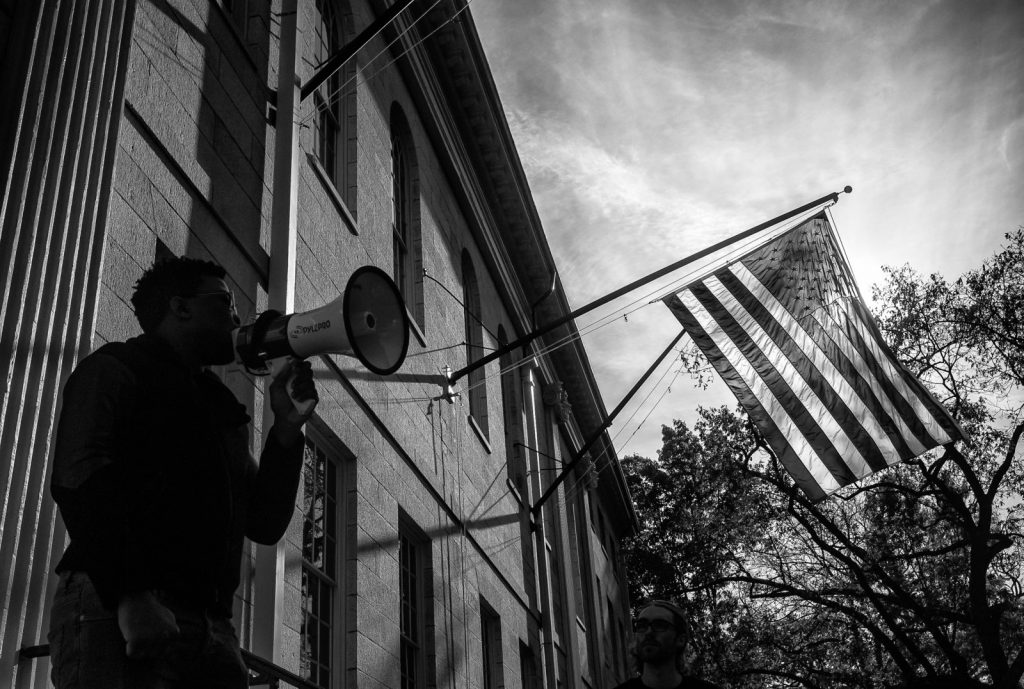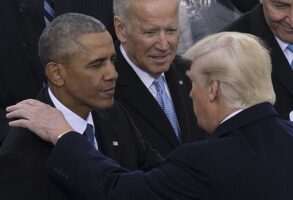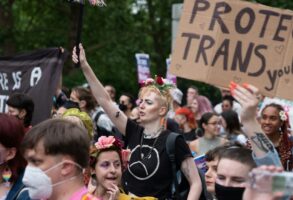
Published November 29, 2018
College students these days appear to possess an almost boundless self-certainty. Protesters on campuses across the country evince a defiant righteousness and exude an air of confidence in the justice and nobility of their actions. Whether it is the Yale debacle from autumn 2015, the Missouri protests of the same year, or more recently the destruction of Silent Sam at the University of North Carolina, in videos recording such protests, students appear not just exuberant but lacking in any circumspection whatsoever regarding the rectitude of their own conduct and causes.
Moral conviction in the service of a just cause is to be admired, and American history is replete with examples. But there is a difference between mature moral conviction and youthful arrogance. Reflecting on the passionate convictions of one’s youth, one is reminded of the old witticism attributed to Mark Twain: When I was seventeen, I couldn’t stand to have my father around while important questions were being discussed, but at twenty-five, it was remarkable how much the old man had improved.
Yet the college campus as currently constituted doesn’t seem to be prompting such a realization. Instead, it encourages youthful arrogance by confusing—or conflating—it with high moral conviction. Rather than helping students probe their moralistic instincts, and thereby foster genuine moderation, the academy seems to reinforce the conviction that “the times, they are a changin’” and that parents should just get out of the way “if they can’t lend a hand.”
Harry Jaffa, in his 1989 lecture “The Reichstag is Still Burning,” locates this confusion in the notion that freedom is considered to be nothing other than the uninhibited expression of the individual. But expression will always be inhibited—at least this side of eternity—because the individual is finite, and so the wish for uninhibited expression quickly degenerates from aspiration to punishment. Mere indifference toward what is expressed itself becomes an unforgivable insult. The aggressive conviction hardens that anything or anyone not affirmatively supportive must be removed at once.
The doctrine of uninhibited expression is, in the context of higher education, another form of the oldest of youthful prejudices: That the young know better and will change the world more comprehensively than their parents could ever dream of doing. Youth has always wished for its conduct to shake the roof-beams of heaven, to have a transcendent, cosmic impact. Again, the desire to mend this broken world is admirable. Yet, in practice, when inflected by the doctrine of uninhibited expression, this desire becomes the permission to assert one’s judgment over the world rather than learn from it, to condemn or even shatter the world rather than understand it.
Indeed, this notion is not only commonplace but is the stuff of self-promotion among colleges and universities today. Take a look at most college advertisements, and you’ll find that students are supposed to judge what is around them rather than learn from it; they are supposed to bring their own ideas to change the world, rather than receive instruction from the institution that is the depository of ideas—the university. So say the universities, and the students are only too happy to have their dreams affirmed. The academy, especially the humanities, emphasize activism, changing the world, transforming man, and regenerating nature.
One would think that the proper response to this phenomenon would be to coach the youth on their own limited and unstable nature, or show them how to sublimate their limitations into concentrated strengths. Yet even the conservative response to the campus crisis of the last few years remains in the mold of assertion and expression rather than moving to the sunlit uplands of inquiry.
Two developments show us that both the progressives and the conservatives operate according to the Doctrine of Assertion. First, the “viewpoint diversity” movement, which has a genuine role to play defending thinkers and professors who might otherwise be cynically cast off by the academy, does not go beyond asking students to sit in judgment between progressive and conservative professors. By what standard might a student make up his or her mind between 18 and 22 years old—a time when, according to every great writer on education, the passions are most in flux and the mind is far more capable of absorption rather than wise judgment?
Second, the arrival onto the college scene of the provocateur Milo Yiannopoulos was welcomed by some as a right-wing response to campus progressives. By aiming to trigger the progressives, Yiannopoulos found the obverse of the coin held by the campus hecklers. The hecklers and Yiannopoulos are meant for one another—both operate according to the principle: Assert, assert, assert, with one’s own potential inhibitions just as much an enemy as one’s ideological foes.
If American higher education wishes to preserve an education that honors man’s freedom from the world, it must rediscover that—in contrast to the doctrine of expression of the uninhibited self—human freedom lies not in raw expression and assertion, but in understanding and receptivity. Liberal education is, as Jaffa reminds his readers, an education in and for freedom—in both its content and practice, it honors man’s freedom as a metaphysical being, on the one hand, and as a social and political animal, on the other. Such an education aims to prepare the student to live a life that honors the freedom with which he has been born.
Liberal education is founded on the recognition that man finds himself in a world without immediately knowing how to rightly act within it, but that since he has been given the freedom to stand apart from it, he has been given the opportunity to come to understand what is right. A liberal education is training in how to stand apart so as to honor both one’s freedom and the demands of the world. It is not uninhibited and boundless expression, but the discovery that freedom, rightly understood, leads to an understanding of boundaries.
Ian Lindquist is Executive Director of the Public Interest Fellowship and a visiting fellow at the Ethics and Public Policy Center. He also served as program manager for education policy studies at the American Enterprise Institute, and was a teacher and assistant headmaster, with Great Hearts Academies in Phoenix, Arizona. His writing has been published by the American Enterprise Institute, The Weekly Standard, U.S. News, and the Washington Free Beacon. Ian is a contributor to the Claremont Review of Books.




